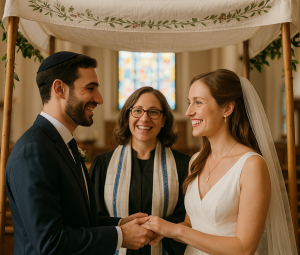 TORONTO — The rabbis who will “speak to” young people who have grown up playing video games are rabbis who are at home in their culture of technology, said the chancellor of the Conservative movement’s Jewish Theological Seminary (JTS) at an Oct. 13 program titled “Not your zayde’s rabbi.”
TORONTO — The rabbis who will “speak to” young people who have grown up playing video games are rabbis who are at home in their culture of technology, said the chancellor of the Conservative movement’s Jewish Theological Seminary (JTS) at an Oct. 13 program titled “Not your zayde’s rabbi.”
Arnold Eisen
Speaking at Beth Tzedec Congregation, Arnold Eisen was joined by Rabbis Adam Cutler, 27, and Jarrod Grover, 28, who responded to his remarks. The two rabbis were ordained this year and work at Beth Tzedec and Beth Tikvah Synagogue, respectively.
As well, noted Eisen, rabbis for the coming generations must love Torah, and have a “passionate, unquestioning, irrational love and faith in the Jewish people,” as well as an openness to the sciences, the arts and the larger culture.
Eisen said that one of the benefits of the current financial crisis is that he and his colleagues have had to think a lot about what is essential to rabbinic education.
Among the aspects he deems important are mysticism and the historic role of women in Judaism.
JTS has a full-time professor of Jewish mysticism, Eisen said. Rabbis need to be familiar with the subject in order to speak to young people exploring spirituality outside of Judaism and who question why their own religion doesn’t offer anything similar.
“And how does Jewish law change and respond to new circumstances?” Eisen asked. “I would submit that only if you know those things are you prepared to carry your tradition authentically forward.”
Also, he said, “you’ve got to trust [your students] and give them the ability to know how and what to change.”
He lauded the school for having done “an excellent job” of teaching rigorous academic studies.
The students need rigorous learning, Eisen said. “But if we are not helping our young rabbis with their own spiritual development, we’re failing them, and failing the congregations that are going to hire them.”
JTS has started to make that shift “in a systematic way” in the last few years, he added. “What you want is rabbis who know how to wrestle, and can help their congregations wrestle.”
As well, he said, rabbis have to know how to fundraise, and “what a budget looks like” in order to serve their congregations well.
But above all, Eisen said rabbis have to know how to bring people together and build community.
Given that the intermarriage rate in the United States hovers at or near 50 per cent, Eisen said he was horrified to learn that a student could graduate from JTS without ever opening a New Testament.
An increasing number of the Jewish population is Orthodox, and Conservative Judaism “is going to shrink as a percentage of the Jewish population,” Eisen said. “Does that mean it doesn’t count? Is less valuable? I don’t think so.”
Eisen said he sees Conservative Judaism as “a precious asset of the Jewish people… no less authentic than Orthodoxy. I regard it as something we dare not lose in this day and age.”
Rabbi Grover said he feels great “that we have a chancellor who gets it. He understands the changes that are taking place in the Jewish world, and how the seminary needs to respond.”
But Rabbi Grover noted as well that he doesn’t think his generation “has the same loyalty to Conservative institutions” that the previous generation did.
Many congregants at Conservative synagogues choose not to send their children to a Conservative day school, even if they think it’s good, he noted as an example. “We’ve got to make sure our product is the best.”
Rabbi Cutler said that his demographic group is “very much a different generation” of Jews. “I live my life on Twitter and Facebook,” he said.
“We need to speak differently… We need to create public rabbis who can speak not just to Jews but to Canada, America and the world. We need to have a public face. It cannot just be a public face of the far right wing [of Judaism]. I think we can still hold that centre.”






